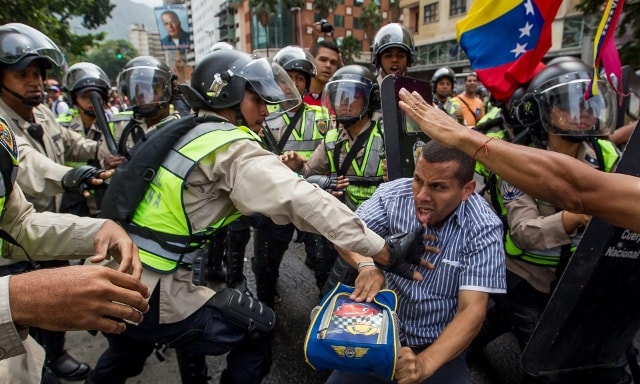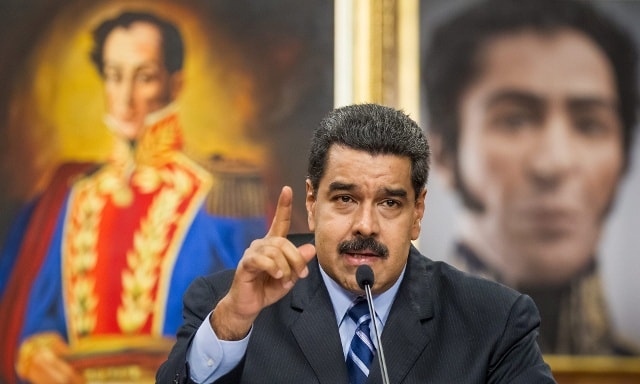Venezuelan President: Not many options left
(Baonghean) - This is not the first time Mr. Nicolás Maduro has faced instability, but the President of the South American country is relying heavily on repressive measures, instead of promoting popular social programs to regain control.
Another day of protests in Caracas. President Nicolás Maduro remains defiant that Venezuela will not become the next left-wing domino to fall in Latin America, but the leader likely has no choice.
 |
| Protesters clash with police during a demonstration in Caracas. Photo: EPA. |
The opposition's campaign for a referendum to remove the President from office ran into a solid wall of riot police and tear gas on May 18.
It should be noted that this is not the first time Mr. Maduro has faced riots, but it is worth noting that the Venezuelan President is now leaning toward harsh repression measures, instead of popular social programs in order to regain control of the country.
In an interview with the Guardian in 2014, when Maduro successfully quelled protests dubbed “the rebellion of the rich” that left 43 people dead, he declared Venezuela a country where “the rich protest and the poor enjoy social welfare.”
Yet, now, no one dares to speak up about social welfare in this South American country. Over the past two years, Venezuela's economy has been on an alarming decline, with the highest inflation rate in the world (estimated by many sources from 180-450%), the most severe recession in Latin America (GDP is expected to fall by 8% this year) and a crisis of food, medicine and electricity shortages.
Outside supermarkets, people are forced to queue for at least 5 hours, even up to 10 hours, just to wait their turn to buy necessities such as corn flour, milk and… toilet paper. Many cities are in a “half-crying, half-laughing” situation because of continuous power outages. Public sector workers now only work 2 days a week to save energy.
Nor is it certain that the anger is confined to the country’s middle class. There have been sporadic protests in recent months in impoverished areas where shortages of food, clean water, electricity and medicine have also driven people into despair.
“These kinds of protests by the poor are really a new phenomenon,” said David Smilde of the Washington office on Latin America. “The opposition always insists that they have been around for a long time, but when you talk to the protesters, they are all middle class. Now it is the poor who are suffering the most.”
The current situation is arguably even more “uncomfortable” than in 2014, as things have gone too far for the government to cover up. And there are too many possibilities for this to explode and spread further in this already unstable society.
The leader is now holding on to power through increasingly repressive measures. Last week, he declared a 60-day state of emergency. Faced with resistance from the National Assembly, he is now running the country by decree. Unlike Chávez, who faced and survived a recall referendum, Maduro lacks the confidence to face a vote.
 |
| Mr. Nicolás Maduro at a press conference at the presidential palace in Caracas. Photo: EPA. |
The opposition claims to have collected nine times the 200,000 signatures needed to trigger a recall vote, but the Election Commission and the Supreme Court are trying to stall for time, saying there are doubts about the authenticity of the signatures.
Government leaders have made no secret of their desire to quell the wave of petitions, with Vice President Aristobulo Isturiz asserting earlier this week: “Maduro cannot be ousted by a referendum because there will be no referendum.”
Time is on their side. If there is no referendum by January 10, midway through Mr. Maduro’s six-year term, there will be no early elections. Instead, Mr. Isturiz would take over if Mr. Maduro is removed from office.
As the deadline approaches, tensions are rising. Opposition leader Henrique Capriles has stressed the urgency of a referendum to “avoid social unrest,” but he has also called on the military to choose sides.
Despite speculation often attributed to anonymous US intelligence sources that a military coup was brewing, the security forces have so far remained loyal to the President. They have also become more sophisticated in their techniques.
Ahead of the May 18 protests, the force closed several subway stations closest to the rally sites, making it more difficult for protesters to reach the protest sites.
While the shortages in the South American country are driving people to despair, it is unlikely that there will be further protests. Many observers say they are impressed by the patience of Venezuelans in the current dire situation. However, many feel that this patience will have a limit and cannot last much longer. Because the situation has become so fragile, when people become hopeless, the only options left are change or chaos.
Phu Binh
(According to the Guardian)
| RELATED NEWS |
|---|



